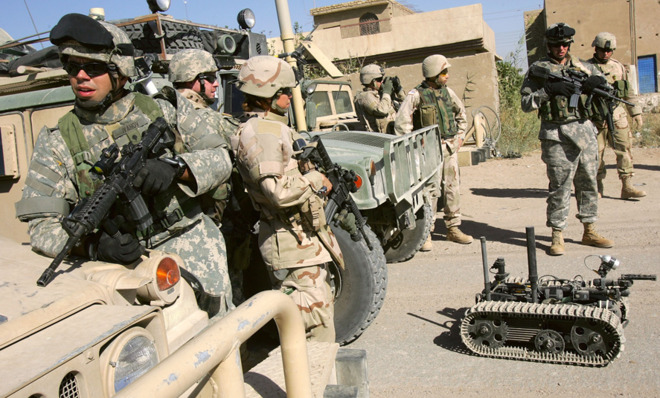The U.S. Army is seriously considering replacing soldiers with robots
The Army is set to trim its ranks by more than 100,000 soldiers. Guess how they're planning to make up the difference?

In industries across the economic spectrum — from food service, to manufacturing, to legal services and medicine — robots and artificial intelligences are taking on what were once exclusively human jobs. And this isn’t just the most basic tasks — as robotics and computing become more sophisticated, the types of work that are being automated are growing in sophistication.
This is coming true in the military, too. Last week at the Army Aviation Symposium, in Arlington, Virginia, Gen. Robert Cone, head of the Army's Training and Doctrine Command, announced that the Army is looking to reduce its human personnel numbers and "recruit" more robots to its ranks.
After a decade of war in Afghanistan and Iraq, the Army is aiming to shrink from 540,000 people down to 450,000 by the end of 2015, and 420,000 by 2019. To do so means individual brigades will will shrink from 4,000 soldiers to 3,000. But that doesn’t have to mean the Army is getting weaker.
The Week
Escape your echo chamber. Get the facts behind the news, plus analysis from multiple perspectives.

Sign up for The Week's Free Newsletters
From our morning news briefing to a weekly Good News Newsletter, get the best of The Week delivered directly to your inbox.
From our morning news briefing to a weekly Good News Newsletter, get the best of The Week delivered directly to your inbox.
General Cone told Defense News: "I’ve got clear guidance to think about what if you could robotically perform some of the tasks in terms of maneuverability, in terms of the future of the force."
He added:
When you see the success, frankly, that the Navy has had in terms of lowering the numbers of people on ships, are there functions in the brigade that we could automate — robots or manned/unmanned teaming — and lower the number of people that are involved given the fact that people are our major cost? [Defense News]
This doesn’t necessarily mean putting robots into frontline combat, at least not immediately. Army personnel flying planes or shooting guns or disarming bombs don't make up a majority of the army. Around two thirds of the army is involved in support operations — logistics, supplies, intelligence, etc. General Cone sees the deployment of robots in such support roles as a way for the Army to become more efficient.
There are already plenty of robot models in development that could be up to the task. Boston Dynamics (now owned by Google) is developing a robot called AlphaDog that can carry very heavy loads over rough terrain, for example.
A free daily email with the biggest news stories of the day – and the best features from TheWeek.com
But robots in combat roles seem inevitable. Unlike humans, robots don’t bleed when shot and they don’t have parents or children worrying about whether or not they will make it back alive. This lack of risk has to make robots an attractive choice for combat; for better or for worse, I think it is only a matter of time before we see robots taking on more active roles in combat. Plenty of those are in being developed, too, including swarms of bee-like assassin robots that can take out targets with chemical injections or explosives.
Of course, some of the military’s early experiments in using robots in combat have proven intensely controversial. The CIA’s drone assassination program in Afghanistan and Pakistan, for example, has resulted in hundreds of civilian casualties due to the misidentification of weddings and tribal gatherings as gatherings of militants. High civilian death tolls result in blowback — blowing up a wedding while hunting down one Islamic militant with a drone could result in ten newly-radicalized Islamic militants taking his place, for example.
This is why a cautious approach — deploying robots in support roles first — is warranted.
John Aziz is the economics and business correspondent at TheWeek.com. He is also an associate editor at Pieria.co.uk. Previously his work has appeared on Business Insider, Zero Hedge, and Noahpinion.
-
 Syria’s Kurds: abandoned by their US ally
Syria’s Kurds: abandoned by their US allyTalking Point Ahmed al-Sharaa’s lightning offensive against Syrian Kurdistan belies his promise to respect the country’s ethnic minorities
-
 The ‘mad king’: has Trump finally lost it?
The ‘mad king’: has Trump finally lost it?Talking Point Rambling speeches, wind turbine obsession, and an ‘unhinged’ letter to Norway’s prime minister have caused concern whether the rest of his term is ‘sustainable’
-
 5 highly hypocritical cartoons about the Second Amendment
5 highly hypocritical cartoons about the Second AmendmentCartoons Artists take on Kyle Rittenhouse, the blame game, and more